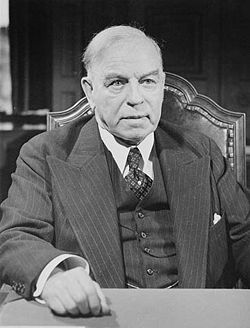| 18th Canadian Parliament | |||
|---|---|---|---|
| Majority parliament | |||
| Feb. 6, 1936 – Jan. 25, 1940 | |||
 | |||
| Parliament leaders | |||
| Prime minister | William Lyon Mackenzie King Oct. 23, 1935 – Nov. 15, 1948 | ||
| Cabinet | 16th Canadian Ministry | ||
| Leader of the Opposition | R. B. Bennett Oct. 23, 1935 – Jul. 6, 1938 | ||
| Robert Manion Jul. 7, 1938 – May. 13, 1940 | |||
| Party caucuses | |||
| Government | Liberal Party | ||
| Opposition | Conservative Party | ||
| Crossbench | Social Credit Party | ||
| Co-operative Commonwealth Federation | |||
| Liberal-Progressive | |||
| Reconstruction Party | |||
| United Reform | |||
| House of Commons | |||
 Seating arrangements of the House of Commons | |||
| Speaker of the Commons | Pierre-François Casgrain 6 February 1936 – 10 May 1940 | ||
| Members | 245 MP seats List of members | ||
| Senate | |||
| Speaker of the Senate | Walter Edward Foster 11 January 1936 – 8 May 1940 | ||
| Government Senate leader | Raoul Dandurand 23 October 1935 – 11 March 1942 | ||
| Opposition Senate leader | Arthur Meighen 22 October 1935 – 16 January 1942 | ||
| Senators | 96 senator seats List of senators | ||
| Sovereign | |||
| Monarch | Edward VIII Jan. 20, 1936 – Dec. 11, 1936 | ||
| George VI Dec. 11, 1936 – Feb. 6, 1952 | |||
| Governor general | John Buchan Nov. 2, 1935 – Feb. 11, 1940 | ||
| Sessions | |||
| 1st session 6 February 1936 – 23 June 1936 | |||
| 2nd session 14 January 1937 – 10 April 1937 | |||
| 3rd session 27 January 1938 – 1 July 1938 | |||
| 4th session 12 January 1939 – 3 June 1939 | |||
| 5th session 7 September 1939 – 13 September 1939 | |||
| 6th session 25 January 1940 – 25 January 1940 | |||
| |||

The 18th Canadian Parliament was in session from 6 February 1936, until 25 January 1940. The membership was set by the 1935 federal election on 14 October 1935, and it changed only somewhat due to resignations and by-elections until it was dissolved prior to the 1940 election.
Contents
- List of members
- Alberta
- British Columbia
- Manitoba
- New Brunswick
- Nova Scotia
- Ontario
- Prince Edward Island
- Quebec
- Saskatchewan
- Yukon
- By-elections
- Notes
- References
- Succession
It was controlled by a Liberal Party majority under Prime Minister William Lyon Mackenzie King and the 16th Canadian Ministry. The Official Opposition was the Conservative Party, led first by Richard Bedford Bennett, and later by Robert Manion.
The Speaker was Pierre-François Casgrain. See also List of Canadian electoral districts 1933-1947 for a list of the ridings in this parliament.
The Social Credit Party led by J. H. Blackmore made their first federal appearance in this parliament. It would be an important third party until 1980. The Co-operative Commonwealth Federation led by J.S. Woodsworth also made their first appearance. It, and its successor party, the New Democratic Party, would become a major source of policies that would change the fabric of Canada.
There were six sessions of the 18th Parliament, though the last two were extremely short:
| Session | Start | End |
|---|---|---|
| 1st | 6 February 1936 | 23 June 1936 |
| 2nd | 14 January 1937 | 10 April 1937 |
| 3rd | 27 January 1938 | 1 July 1938 |
| 4th | 12 January 1939 | 3 June 1939 |
| 5th | 7 September 1939 | 13 September 1939 |
| 6th | 25 January 1940 | 25 January 1940 |